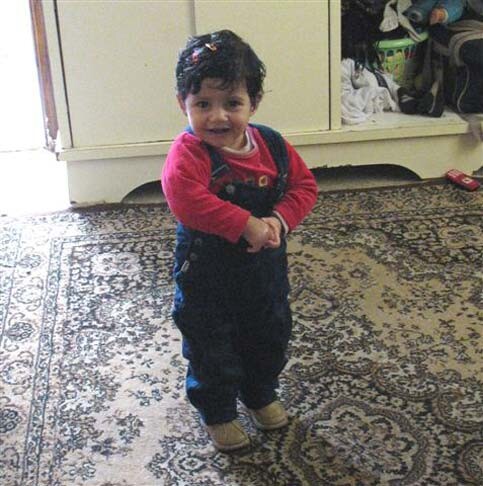IRIN 27 January 2007

One-year-old Banine normally walks barefoot in the house so as not to disturb the neighbours. (Marie Claire Feghali/IRIN)
BEIRUT, 22 Jan 2007 (IRIN) - Thousands of Iraqis who have fled the violence in their country are stranded in Lebanon seeking asylum, according to a senior United Nations official.
Having not signed the UN’s Convention relating to the Status of Refugees, introduced in 1951, Lebanon does not grant asylum to any refugees, despite the presence on its territory of hundreds of thousands of Palestinians.
“Ninety-five percent of asylum seekers today enter Lebanon illegally through the Syrian borders and 80 percent of them are Iraqis. So Lebanese authorities send them to jail, and force them to go back to their countries of origin no matter what,” said Dominique Tohme, Protection Officer in Lebanon for the UN Refugee Agency (UNHCR).
There is no official figure for the number of Iraqi refugees in Lebanon. Nevertheless, Tohme said nearly 3,000 Iraqis are registered asylum seekers who will be expatriated to a third country once their paper work is finished.
Like thousands of other Iraqis, Ahmed Kazim fled his home in Iraq when the violence became unbearable. Sectarian violence between Sunni and Shi’ite Muslims escalated dramatically after an attack on an important Shi’ite shrine in the northern Iraqi city of Samarra in February last year.
“I wouldn’t trade Iraq for the world,” said Ahmed, looking sadly at the crumbling ceiling of his rented house in the poor southern suburbs of Beirut. “But we couldn’t stay in Iraq, so many of my family members were killed.”
Ahmed’s wife and five children, aged 8 to13, are still in Baghdad. They anxiously await their turn to go to Lebanon, after Ahmed followed his brothers Mustapha and Mahmud, their families, and their mother and father.
“They [my parents] came earlier, after my uncle was beheaded. He used to be the chief of the municipality, and had nothing to do with the war. The terrorists saw him on TV once - a month later they killed him,” said Ahmed.
Ahmed’s uncle was not the only victim in the family. Two of his in-laws and three of his cousins have also been killed by militias.
Thrown in the streets
“When we decided to flee Diyala province, my father said he didn’t want the family to be divided. When Ahmed followed, we all came to live in the same place. We are 11 now. Next week, Ahmed’s family is coming, they are six. My sisters are still in Baghdad, but they cannot come if we’re to be thrown in the streets,” said Mahmud.
Because of the size of their family and the potential strain on resources, Ahmed said the landlord wanted to kick them out of the house at the end of the month. They pay 200,000 liras (about US $135) per month for their dilapidated home in the southern suburbs of Beirut, which are dominated by Shi’ites like them.
“He [the landlord] says he needs to use the house, but I think he’s annoyed because 11 of us live here. Where will I take my family?” Ahmed asked. “What shall we do? No one is willing to rent us their house because they think we will use too much water and electricity. So now we run to the suburbs looking for another place to stay, and we’re running out of time.”
To cover the smell of moist, Mahmud’s wife, who is nine months pregnant, burns incense. His one-year-old daughter, Banine, walks barefoot in the house, as do all the family in order to keep the house quiet, fearing to upset their landlord.
Unlike thousands of Iraqis in Lebanon, Mahmud entered the country legally. But that has not made it any easier for him, Ahmed or anyone else in his family to find work.
“In Iraq, I worked as a plumber,” said Ahmed. “I have been here for over a month now, and haven’t been able to find any job. Instead, I spend the day looking for a proper house. Our savings are low and everything here is so expensive. All I wish is for my country to get back on its feet so that we can rebuild our lives. If it was safe there, I wouldn’t have come, but I need a safe environment for my children and a dry roof over their heads.”
This item comes to you via IRIN, a UN humanitarian news and information service, but may not necessarily reflect the views of the United Nations or its agencies. All IRIN material may be reposted or reprinted free-of-charge; refer to the copyright page for conditions of use. IRIN is a project of the UN Office for the Coordination of Humanitarian Affairs.
Related Links